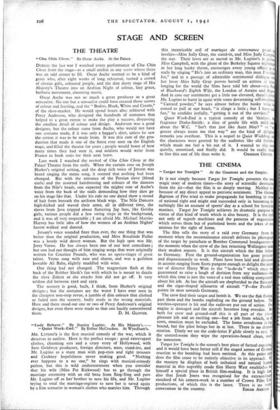STAGE AND SCREEN
THE THEATRE
Chu Chin Chow." By Oscar Asche. At the Palace.
DURING the last war I watched every performance of Chu Chin Chow from the stage—as a small urchin in any scene where there was an odd corner to fill. Oscar Asche seemed to be a kind of genie who, after eight weeks of long rehearsal, turned a crowd of chorus girls, coloured people, and the dim dusty stage of His Majesty's Theatre into an Arabian Night of colour, lazy grace, barbaric movement, charming music.
Oscar Asche was not so much a great producer as a great sensualist. No one but a sensualist could have created those scenes of colour and feasting, and the " Bodies, Black, White and Cream," of the slave-market. He would spend hours after rehearsal with Percy Anderson, who designed the hundreds of costumes that helped to a great extent to make the play a success, discussing the smallest detail of colour and design. Anderson was a good designer, but the colour came from Asche, who would not have one costume made, if it was only a beggar's shirt, unless he saw the cotton it was to be made from. It was this care of the pro- duction that made it one of the finest ever seen on the English stage, and filled the theatre for years ; people would boast of how many times they had seen it, and soldiers would write from France to book seats for their next leave.
Last week I watched the revival of Chu Chin Chow at the Palace Theatre from the stalls. When the curtain rose on Joseph Harker's original setting, and the deep rich voice of Jetsam was heard singing the menu song, it seemed that nothing had been changed. But with the entrance of the Persian slave (blond curls) and the assorted hairdressing and colours of the dancers from the Nile's heads, one expected the mighty roar of Asche's voice from the back of the stalls demanding how they dare go on his stage like that. Under his rule no one dared show a strand of hair from beneath the uniform black wigs. The Nile Dancers high-kicked and waved their arms, all in different time, the slaves from Java tripped about fluttering Jap fans, like Geisha girls, various people did a few swing steps in the background, and it was all very respectable ; I am afraid Mr. Michael Martin- Harvey has little idea of how the women of an Arabian Nights' harem walked and danced.
Jetsam's voice sounded finer than ever, the one thing that was better than the original production, and Miss Rosalinde Fuller was a lovely wild desert woman. But the high spot was Mr. Jerry Verno. He has always been one of our best comedians ; but one had not thought of him singing songs that were originally written for Courtice Pounds, who was an opera-singer of great talent. Verno sang with ease and charm, and was a guileless loveable Ali Baba, slightly muddled with wine.
One thing had not changed.. The magnesium flash at the back of the Robber Sheik's fan with which he is meant to dazzle the slave Zahrat as she attacks him did not go off. It very seldom did between 1916 and 1919.
The scenery is good, built, I think, from Harker's original designs ; but the costumes are the worst I have ever seen in the cheapest non-stop revue, a jumble of dim colours that clashed or faded into the scenery, badly made in the wrong materials. Here and there stood out one or two of Percy Anderson's original designs, but even these were made so that one hardly remembered


























 Previous page
Previous page